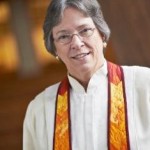How the Black Church Bucks the Trend of Decline
 People who write about the current religious scene in the USA are quick to comment on the rise of the “Nones” (people with no religious affiliation), the decline of the mainline church (steep), and the decline of Christianity in America in general (not as steep but noticeable.) I think the rise of the “nones” is not much of a story — people no longer go to church because its the thing to do — we’ve known this for a long time. These people are not necessarily — or even likely to be — atheists or secularists. They are that demographic that used to attend church — or identify with a church while rarely attending — who now don’t.
People who write about the current religious scene in the USA are quick to comment on the rise of the “Nones” (people with no religious affiliation), the decline of the mainline church (steep), and the decline of Christianity in America in general (not as steep but noticeable.) I think the rise of the “nones” is not much of a story — people no longer go to church because its the thing to do — we’ve known this for a long time. These people are not necessarily — or even likely to be — atheists or secularists. They are that demographic that used to attend church — or identify with a church while rarely attending — who now don’t.
It’s not a crisis when people don’t come to church. It’s a crisis when the church stops spreading the Gospel of Christ. The Great Commission was never: “let people come to you.” It was: “go into all the world and make disciples.”
The more evangelical (its hard thing to measure precisely) segment of the church seems to be holding its own — maybe. (I personally wonder how much evangelical and conservative decline might be related to the resurgence of hard line Calvinism — but, again, that would be hard to measure.)
But, Adelle M. Banks reports in the Relifion News Service that this is not so much the trend in the black Church: Black churches bucking the trend of decline. She writes:
A recent Pew Research Center survey found that Christians are losing their share of the U.S. population, dropping to 71 percent in 2014, down from 78 percent in 2007, with young people leading the exodus. But historically black denominations have bucked that trend, holding on to a steady percent of members during that same period.
As significant, the share of millennial-generation African-Americans who affiliate with historically black churches is similar to that of older churchgoers.
There are numerous reasons why some black churches retain their members, but, most prominently, the church has played a historic role in black life that has fostered a continuing strong black Protestant identity. Members and visitors at Alfred Street say the church’s holistic ministry — the preaching, the singing and the community outreach — are what draw them in and keep them there.
This seems to me a great formula for any church to consider. What can keep a church from declining? The article suggest these factors: (1) impassioned preaching, (2) inspiring music, and (3) outreach into the community.
If the church is reaching out to the community in ways that clearly benefit the community (and not just themselves) it gains a hearing in the community. When worship and preaching are engaging people have a reason to attend and return.
It seems to me like a simple strategy that any church could begin to implement. I see no reason mainline churches couldn’t implement it just as much as any other church could.
Banks says the black church is not immune to the declines experienced by other churches:
Like the rest of the U.S. population, some African-Americans are disaffiliating. The Pew survey found that 18 percent of African-Americans describe their religious affiliation as atheist, agnostic or “nothing in particular,” compared with 12 percent in 2007. The share of U.S. blacks who fit in the “nones” category rose at about the same rate as the general population, said Greg Smith, associate director of research at Pew.
Still, the black church has managed to weather the storm (if it is a storm) and hold its own. It may be a good example to follow.













